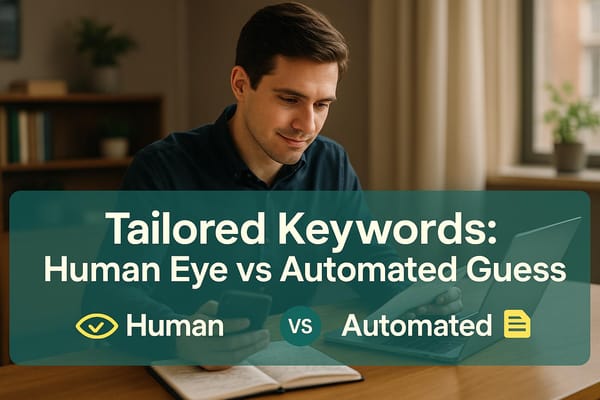5 Signs You Need Help With Your Job Search
Struggling with your job search? Discover 5 signs you need help and actionable tips to improve your chances of landing a job.

Struggling with your job search? Here's what you need to know right now:
| Sign You Need Help | Quick Fix |
|---|---|
| No replies to applications | Fix ATS-friendly resume |
| Can't pass first interviews | Practice + research companies |
| Mixed messages in materials | Match all job documents |
| Weak professional network | Connect with industry people |
| Too much time on applications | Use quick-apply, focus on quality |
Here's the reality of job hunting in 2023:
| Current Job Market | Numbers |
|---|---|
| Applications per job | 250+ |
| ATS rejection rate | 75% |
| Average hiring time | 44 days |
| Network success rate | 80% |
Bottom line: If you're just hitting "apply" online, you're doing it wrong. The data shows:
- 80% of jobs never hit job boards
- 75% of resumes get stuck in ATS systems
- Only 22% of applicants get interviews
- Network referrals boost success rates by 50%
Want better results? Focus on:
- ATS-friendly resumes
- Company research before interviews
- Consistent job materials
- Building industry connections
- Quick applications for matched jobs
Skip the endless applications. Start with fixing these 5 signs, and you'll see better results fast.
Related video from YouTube
No Replies to Job Applications
Let's look at the cold, hard facts: you submit an application and... silence. One study tracked 92 applications over two months. The result? 82% of companies never responded.
Here's what you're up against:
| Application Reality | Numbers |
|---|---|
| Average Applications per Job Opening | 250 |
| Applications Filtered by ATS | 75% |
| Applicants Getting Interviews | 22% |
| Applications Needed for One Offer | 21-80 |
Want the brutal truth? 75% of resumes get stuck in ATS systems. They never make it to human eyes.
Two big problems block your path:
- Too many applications: Companies get flooded with 1000+ submissions per post
- ATS systems: Software filters out resumes that don't match specific criteria
"Job applications are not an easy thing to do and lack of response to one who put in the effort might be considered not caring." - Guy Gray, Author of www.ravensrationale.com
Here's what successful job hunting looks like:
| Weekly Application Goals | Expected Results |
|---|---|
| Minimum Applications | 10-15 |
| Daily Applications | 2-3 |
| Focus on Quality vs Quantity | High |
Not getting responses? Your application might need work. Here's what to fix:
- Add keywords from the job post
- Use basic file types (.pdf or .docx)
- Skip fancy formatting
- Show numbers and results
Here's the thing: just clicking "apply" online isn't enough anymore. Post-pandemic job hunting needs a smarter strategy than mass-applying to every opening you see.
2. Not Getting Past First Interviews
First interviews are a numbers game. Here's what you're up against:
| Interview Reality | Statistics |
|---|---|
| Employers who decide within 5 minutes | 49% |
| Employers who decide within 15 minutes | 90% |
| Job seekers who research companies | 53% |
| Candidates who send thank-you emails | 10% |
Those numbers tell us something big: You've got 5-15 minutes to make your case. And most people? They're messing it up in these ways:
| Interview Mistakes | What It Tells Employers |
|---|---|
| Zero company research | "I don't care about this job" |
| Cookie-cutter answers | "I'm just like everyone else" |
| Winging it | "I didn't take this seriously" |
| No follow-up | "I'm not that interested" |
"It is so important to spend five minutes to go on to the website, see what the company does, how they started and any general information you can get. This really makes someone stand out from the 100s of applicants." - Mike Carlucci, Managing Director of Tenuta Marmorelle
Here's your game plan:
| Action Step | What to Do |
|---|---|
| Know the company | Deep-dive their website and latest news |
| Nail your answers | Practice out loud, not just in your head |
| Master the basics | Strong eye contact, firm handshake |
| Send that email | Quick thank-you note within 24 hours |
"Most interviewers can easily catch on when a candidate has turned up unprepared and when they do, they can lose interest in that candidate quite quickly." - Habiba Khatoon, Director of Robert Walters UK
Here's the truth: The U.S. Bureau of Labor Statistics says you'll need 10-15 interviews to land one offer. That's WITH good prep. Without it? You're looking at way more.
Here's a power move for your next interview: At the end, ask "Based on our conversation, do you have any specific concerns with my qualifications for the role?" It's your chance to tackle doubts head-on.
3. Mixed Messages in Your Job Materials
When your job materials don't match, hiring managers notice. Here's what they see:
| Common Mismatches | Impact on Your Application |
|---|---|
| Different job titles | Makes employers question accuracy |
| Conflicting dates | Shows poor attention to detail |
| Varying responsibilities | Creates doubt about experience |
| Inconsistent skills | Questions your qualifications |
The stakes? HIGH. 74% of managers make wrong hiring choices, costing companies $14,900 per year. You can't risk sending mixed signals.
Each job document serves a specific purpose:
| Document | Primary Purpose | Key Focus |
|---|---|---|
| Resume | Job-specific details | Targeted achievements |
| Career overview | Full professional story | |
| Cover Letter | Personal connection | Role-specific fit |
"If they don't correspond, employers will wonder if you're hiding something or are just careless." - John Vicidomino, Hiring Manager and CEO
Here's how to fix your materials:
| Area to Check | What to Do | Why It Matters |
|---|---|---|
| Job Titles | Match exactly | Shows consistency |
| Employment Dates | Use same dates | Builds trust |
| Skills Listed | Keep core skills aligned | Proves reliability |
| Project Details | Match descriptions | Shows attention to detail |
Here's a smart example: A financial controller wanted to move into IT. Her resume highlighted IT experience, while her LinkedIn showed both Finance and IT. This kept her job search private while staying honest.
Make it easy: Create ONE master document with ALL your career details. Use it every time you update your materials. This stops those small mistakes that can cost you interviews.
"Certain inconsistencies would clearly disqualify a candidate in my mind." - John Vicidomino, Hiring Manager and CEO
Bottom line: Your job materials are legal documents. Wrong or mismatched info won't just confuse - it'll KILL your chances.
sbb-itb-564272e
4. Weak Professional Network
Here's something most people don't know: 70-80% of jobs never make it to job boards. They get filled through networking.
Think about that for a second:
If you're ONLY hitting "apply" buttons, you're missing 8 out of 10 job opportunities.
Let me show you what a weak network looks like:
| Warning Sign | What It Means |
|---|---|
| Under 500 LinkedIn connections | You're not reaching enough people |
| No industry events | You're invisible offline |
| Few contacts at target companies | You can't access hidden jobs |
| Dead LinkedIn profile | Recruiters can't find you |
| No contact with ex-colleagues | You're losing easy referrals |
Here's what's interesting: LinkedIn studied 20 million users and found something surprising. People you barely know help more with job hunting than close friends.
Different connections bring different results:
| Connection Type | What They Bring |
|---|---|
| Close Friends | Limited new leads |
| Casual Contacts | Fresh opportunities |
| Industry People | Direct hiring access |
| School Alumni | Built-in trust |
"Head-hunters only see 13-17% of jobs. Focus only on them, and you'll miss 80% of opportunities." - Hervé Bommelaer, Networking Coach
Let's talk numbers:
| Approach | Success Rate | Time Needed |
|---|---|---|
| Random Applications | 4% work | Lots |
| Someone Refers You | 50% work | Some |
| Loose Contact Helps | 70-80% work | Little |
Here's a real story: Mathilde got her ad agency job through people she barely knew. Why? Because turning down a job is easier when you're not dealing with close friends.
"Networking isn't about quick wins. It's about building trust and helping others first." - Elise Powers, Eleview Consulting
Fix your network now:
- Message old coworkers at companies you like
- Jump into LinkedIn industry groups
- Show up at industry meetups
- Follow up fast (24 hours max)
- Ask directly for hiring manager intros
Bottom line: 85% of recruiters check LinkedIn before hiring. Your network isn't about quantity - it's about who'll speak up for you.
5. Too Much Time on Applications
Here's a hard truth: spending hours on job applications doesn't work. 70% of candidates drop off when applications take over 15 minutes.
Let's look at what slows people down:
| Time Waster | Reality Check |
|---|---|
| Account creation | 83% of Fortune 500 jobs force you to register |
| Typing everything | 61% apply on phones - it's painfully slow |
| Complex forms | 6 in 10 sales pros give up |
| No responses | 75% never hear back after interviews |
The numbers don't lie:
| Application Time | What Happens |
|---|---|
| Under 5 mins | +365% more people finish |
| Over 15 mins | 70% drop out |
| Over 30 mins | Nobody finishes. Zero. |
"ABL - always be looking. But don't turn your job search into a second job." - Leela Yanamaddi, scale.jobs founder
Here's what to do instead:
| Smart Move | Bad Move |
|---|---|
| Quick-apply buttons first | Long forms first |
| Deep apps for dream jobs only | Same effort everywhere |
| Use autofill | Type everything |
| Keep a spreadsheet | Random applying |
| Talk to people | Just click apply |
Want better results? Make it quick. 5-minute applications get 365% more responses. Most people do it backwards - they spend hours on applications that vanish into the void.
| Timeline | Reality |
|---|---|
| First week | Half expect answers |
| Two weeks later | People move on |
| One month passes | 75% won't recommend |
Do this instead:
- Save the long apps for jobs with inside connections
- Hit quick-apply whenever you see it
- Skip account creation until you need it
- Keep references for later
- Build one master resume to copy from
Bottom line: If you're spending over 30 minutes per application, you're doing it wrong. The fastest applications often get the most responses.
Ways to Get Help
Here's what you'll pay for different job search services:
| Service Type | Cost Range | What You Get |
|---|---|---|
| Resume Writing | $100-400 (entry) | Custom ATS-friendly resume |
| $350-750 (mid-level) | Cover letter, LinkedIn profile | |
| $600-2500 (executive) | Full career documents | |
| Career Coaching | $75-250/hour | Job search strategy, interview prep |
| Reverse Recruiting | $999-4999 | Someone applies to jobs for you |
| Staffing Agency | Free for candidates | Direct employer connections |
"Your job search moves faster when you ask for help from people who've done it before." - Mac Prichard, Author
Here's where to get free or cheap help:
| Resource | Benefits |
|---|---|
| College Career Centers | Resume workshops, job boards |
| Professional Groups | Industry connections, events |
| LinkedIn Learning | Skills training, certificates |
| Job Boards | Indeed, LinkedIn job alerts |
| GoSkills | Online courses, certifications |
Want to get the most from paid help? Follow these tips:
| Do This | Not That |
|---|---|
| Check certifications (PARWCC, NRWA) | Pick the cheapest option |
| Get sample work | Skip research |
| Read client reviews | Rush the process |
| Compare packages | Pay for extras you won't use |
| Ask about guarantees | Expect instant results |
Here's something most people don't know: 80% of jobs NEVER show up on job boards. That's why networking beats sending applications all day.
Make these connections work for you:
| Connection Type | How to Use It |
|---|---|
| Past Coworkers | Ask for company intros |
| Alumni Network | Request informational calls |
| Industry Groups | Attend virtual events |
| Follow target companies | |
| Recruiters | Build relationships early |
Pro tip: Don't just ask for "help." Be specific. Say: "Would you have 15 minutes to discuss marketing roles at [Company]?"
If you're a veteran or military spouse, check out Hire Heroes USA. They've helped 70,000+ people land jobs - and it's FREE.
The numbers don't lie: 73% of job seekers find the process super stressful. Getting help isn't weakness - it's smart business.
Next Steps
Here's how to kickstart your job search:
| Service | Where to Start | Cost Range |
|---|---|---|
| Resume Help | Find PARWCC or NRWA certified writer | $350-750 |
| Career Strategy | Book 1-2 coaching calls | $75-250/hour |
| Application Help | Check out scale.jobs assistant | Custom |
| Network Building | Join key industry groups | $0-200/year |
| Skills Training | Try LinkedIn Learning | $39.99/month |
Start With Free Options
Don't spend money until you've used these resources:
- Alumni career center
- Local job fairs
- Government job programs
- LinkedIn job alerts
Pick ONE Focus Area
- Fix your resume
- Practice interviews
- Plan your search
- Build your network
Know Your Budget
| Level | Monthly Spend | What You Get |
|---|---|---|
| Basic | $0-200 | LinkedIn Premium + courses |
| Mid | $200-500 | Resume help + coaching |
| Full | $500+ | Complete career package |
Quick Wins (Do These Today)
| Task | Time | Result |
|---|---|---|
| Job alerts | 15 min | Daily job matches |
| Contact old coworker | 5 min | Possible job lead |
| Update LinkedIn | 10 min | Better visibility |
| Join industry group | 20 min | More connections |
Track These Numbers
| What | Weekly Target |
|---|---|
| Job apps | 10-15 |
| New contacts | 3-5 |
| Follow-ups | 5-7 |
| New skills | 1-2 |
Here's the key: 80% of jobs come from networking. Use paid help for your materials, but spend most time building connections.
Still not sure? Book ONE coaching session. You'll learn exactly what help you need most.
FAQs
When to work with a career coach?
Here's when you need a career coach:
| Problem | How a Coach Helps |
|---|---|
| 50+ applications, zero replies | Fixes your resume and application approach |
| Same job for 3+ years | Maps out your next career move |
| Interviews but no job offers | Boosts your interview skills |
| Job search burnout | Gets you back on track |
"If you're sending out resumes without bearing fruit, a career coach can help." - Rita Friedman, JCTC, JCDC, CLC, Career Coach, Philadelphia
Why is there no response to my job application?
Here's what's happening behind the scenes:
| Issue | What to Do |
|---|---|
| ATS blocking your resume | Add exact keywords from job post |
| Too many applicants | Each job gets 118+ applications |
| Resume needs work | Get expert feedback |
| Skills don't match | Pick jobs that fit your background |
Here's the thing: Most companies don't send rejection emails. No response usually means your application is still in the queue.
Why is no one replying to my application?
The numbers tell the story:
| What Happens | Stats |
|---|---|
| Applications per job | 118 |
| Actually qualified | 25% |
| Get interviews | 20% |
| Wait time | 1-2 weeks |
Want better results? Here's what works:
- Send a follow-up after 7 days
- Skip job boards, go straight to company sites
- Ask your network for referrals
- Apply to jobs where you match most requirements





